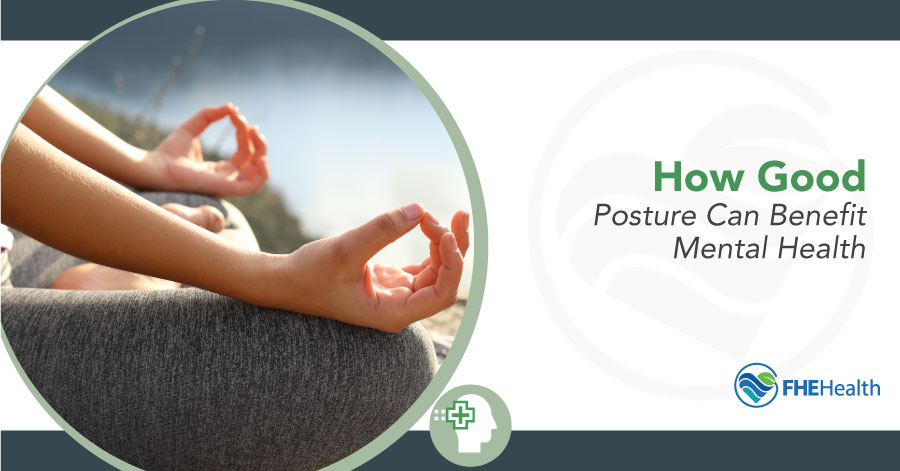
You’ve probably heard someone say things like “Sit up straight,” “Square those shoulders” or “Chin up.” This advice may be focused quite literally on good posture and not slouching. However, you may have also heard someone say how keeping your shoulders back and your chin up can convey confidence and better mental health.
But is there any truth to this? And if so, does this mean you could enhance your mental health just by improving your posture? Keep reading to learn how posture and mental health may be related and how you can see for yourself.
Is There a Relationship Between Posture and Better Mental Health?
Mental health is a complex topic, and every individual is unique. So while it may seem odd to talk about how simply standing up straighter could improve your mental health, it turns out that there’s some scientific evidence for this idea.
In a 2014 study published in Health Psychology, researchers wanted to find out if body posture was related to how emotions are triggered and controlled. This study specifically looked at the difference between upright and slumped seated positions, but it’s likely that the results could be similar for standing postures. Here’s what they found.
The study included 74 people. Each participant in the study was asked to complete a stress task while in either a seated slumped posture or a seated upright posture. Participants who used upright postures “reported higher self-esteem, more arousal, better mood and lower fear, compared to slumped participants.” Those who were slumped over also used a greater number of words with negative connotations.
The study shows that there likely is a correlation between mental health and posture, and that’s something you can use to your advantage. Smiling even when you don’t feel like it can help your brain release positive chemicals. So can standing up straight and taking on a confident body posture.
Good posture sends the message to your body that you’re able to handle the task before you, and your brain acts accordingly. If you’re interacting with others, they’ll also likely recognize this confident posture and respond to it, which can reinforce the reactions in your brain.
Keep in mind that standing up straight isn’t a magic cure-all for mental illness, or really any physical or mental issue. But it can be a good tool to use when you’re feeling stressed or anxious. However, suspected mental illness needs to be reviewed by a professional who can offer a proper diagnosis, if necessary, and give you options for treatment that go beyond lifting your chin.
Does Better Posture Offer Other Benefits?
It turns out that having better posture can offer more benefits than just making you feel better about yourself. It can also improve everything from a backache to slow digestion. Here are just some of the benefits of better posture:
- Increased energy
- Better spine and neck health
- Less stress on your bones and joints
- Improved core strength
- Easier and deeper breathing
- Reduction in frequency and/or intensity of headaches
Because your spine runs the length of your torso, going from the base of your head to your tailbone, it has an effect on pretty much every part of your body. This means that if something isn’t quite right with your alignment — which is very common for people who chronically slouch and slump — it can cause pain and other issues in many areas of the body, from your lower back to your shoulders.
Posture has been an increasing problem in our modern society because we spend so much more time now on technology and looking at screens, which doesn’t promote good posture. When you’re looking down at your phone, you naturally slump your shoulders and lower your head, putting increased pressure on your neck and misaligning your spine.
Can Carrying Yourself Better Actually Improve Your Mental Health?
While there may not be a direct causal relationship between your posture and your mental health, how you carry yourself can affect your self-confidence and how others perceive — and therefore treat — you.
Think about the people you’ve met and interacted within your own life. Try to remember someone who was confident in who they were and how they interacted with others. Did they stand up straight? Probably. They also likely made direct eye contact (which is easier to do if you’re not hunched over), smiled and engaged in conversation.
Now think about someone who didn’t come across as confident. Did they slump their shoulders or look toward the floor? Did they cross their arms or legs, which made them look less approachable?
All these postures and positions are body language that others use to interpret what kind of person you are and determine how they respond to you. But what if you’re struggling with your mental health? Is it worth trying to “fake it”? The answer is, quite possibly, yes!
Standing up a little taller, squaring your shoulders, focusing on looking ahead and making direct eye contact can help you feel more confident. It may also help others treat you as such. This creates a positive feedback loop that makes you feel even more confident.
And even if you don’t notice a change in your mental health from adjusting your posture, you can at least know that you’re helping keep your spine and digestive system a little healthier.
If you’re struggling with a mental health issue and it’s affecting your quality of life, it can get better. Talking with a mental health professional can help you identify areas in your life that are impacting your mental health and help you become aware of other issues that may be co-occurring. To find out more about our programs and how our staff can help you or a loved one, contact FHE Health today by calling (833) 596-3502.






